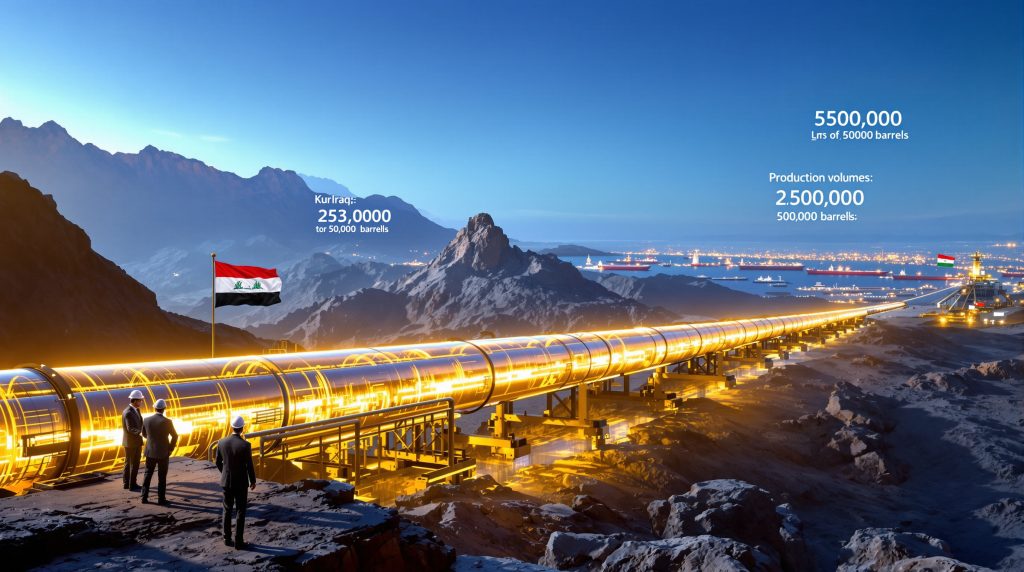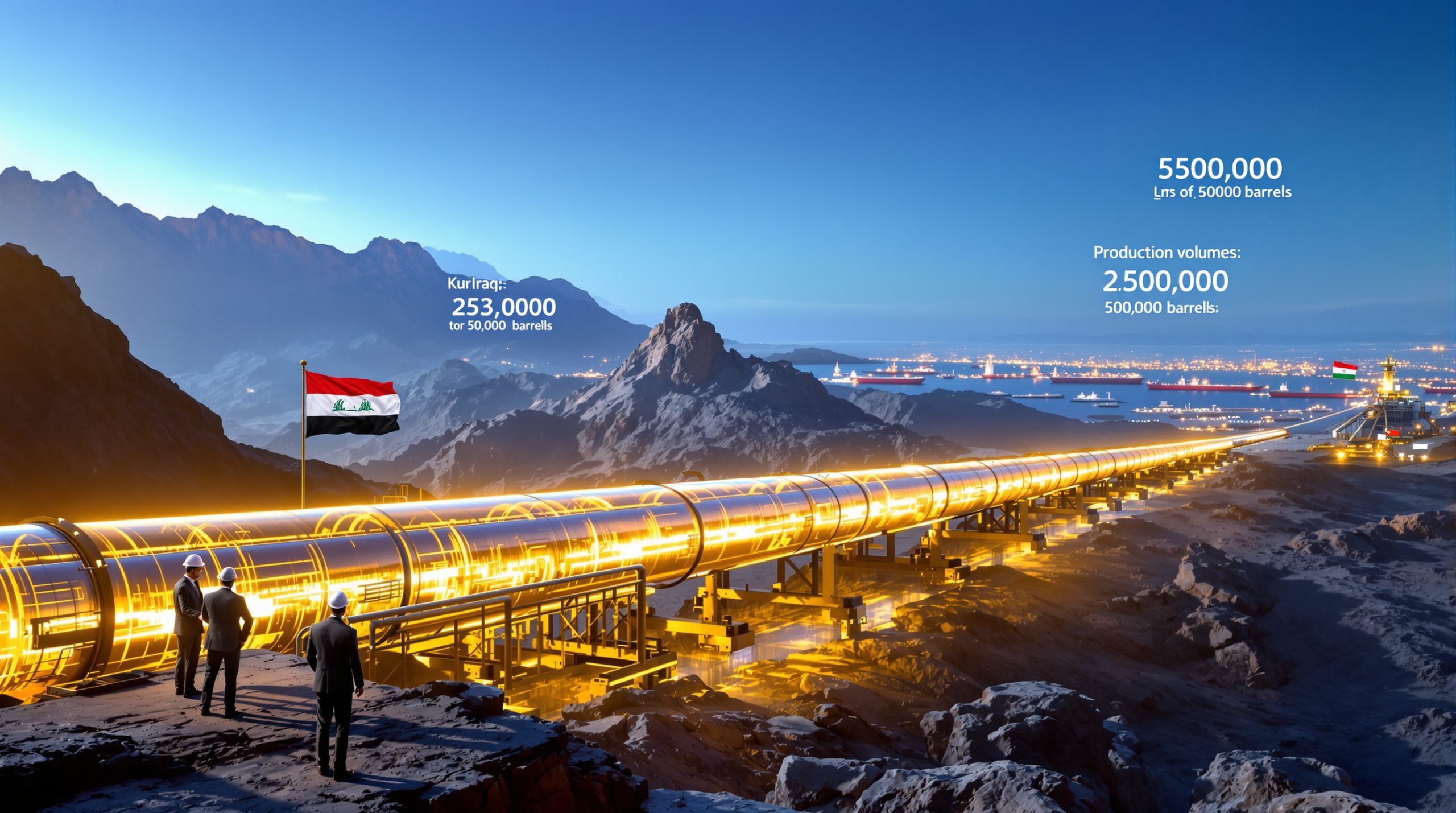Kurdish Oil Exports Negotiations: A Comprehensive Analysis
The long-suspended Kurdish oil exports are on the verge of resumption following a breakthrough agreement between multiple stakeholders. After approximately 30 months of halted operations, the Iraq-Turkey pipeline is expected to begin transporting Kurdish crude oil to international markets imminently. This development represents a significant shift in regional energy dynamics and marks the culmination of nearly two decades of complex Kurdish oil exports negotiations.
Recent Developments in the Kurdistan-Baghdad Oil Dispute
The imminent restart comes after intensive negotiations involving the Iraqi federal government, the Kurdistan Regional Government (KRG), and international oil producers operating in the region. The agreement enables the initial export of approximately 230,000 barrels per day (bpd) through the Iraq-Turkey pipeline to the Mediterranean port of Ceyhan, with potential to scale up to 400,000-500,000 bpd as infrastructure and production capabilities expand.
The suspension created significant economic challenges for the Kurdistan region, which relies heavily on oil revenues to fund its operations and public services. The breakthrough agreement represents the culmination of months of intensive negotiations aimed at resolving these fundamental issues.
Timeline of Export Suspension and Negotiation Process
The Kurdish oil export suspension began in March 2023, triggered by long-standing disputes over revenue sharing and authority between Baghdad and Erbil. This suspension lasted for approximately 30 months, creating severe economic strain for the Kurdistan region.
Throughout this period, multiple rounds of negotiations took place, with significant progress made during late 2024 and early 2025. International diplomatic support, particularly from the United States under the Trump administration, helped facilitate dialogue between the parties.
How Does the New Kurdish Oil Export Agreement Work?
Centralized Marketing and Revenue Distribution Mechanism
Under the new framework, the Iraqi Ministry of Oil will take delivery of Kurdish crude for export via its State Oil Marketing Organization (SOMO). This centralized approach ensures transparent revenue collection and distribution, with proceeds flowing to the federal budget before appropriate allocations are made to the Kurdistan region and public services.
The revenue distribution follows a formula outlined in Iraq's federal budget law, with allocations based on population percentages and development needs. This represents a significant shift from previous arrangements where the KRG marketed oil independently.
Key Stakeholders and Their Roles
The agreement involves multiple parties with distinct responsibilities:
- Iraqi Federal Government: Provides legal authority for exports and manages revenue collection through SOMO
- Kurdistan Regional Government: Coordinates with producers and manages regional oil infrastructure
- International Oil Companies: Operate fields and deliver crude to the export pipeline
- Turkish Government: Facilitates transit through its territory to Mediterranean ports
Each stakeholder has committed to specific obligations to ensure the agreement's sustainability. The federal government guarantees timely revenue transfers, while the KRG ensures transparent production reporting.
Legal Framework and Regulatory Oversight
The new arrangement establishes clearer legal parameters for Kurdish oil exports, addressing previous ambiguities that led to international legal challenges. By formalizing federal oversight while respecting Kurdistan's regional autonomy in certain aspects of oil management, the agreement creates a more stable regulatory environment for continued investment and operation.
The legal framework includes dispute resolution mechanisms and international arbitration provisions to address potential disagreements, providing investors with greater certainty.
What Production Volumes Can We Expect from Kurdish Oil Exports?
Current Production Capacity and Initial Export Volumes
The Kurdistan region's current export capacity through this agreement stands at approximately 230,000 bpd. This represents a significant portion of Kurdistan's total production potential, though still below peak historical levels achieved before the suspension. Initial exports are expected to begin within days of the late September 2025 agreement, potentially as early as September 27.
This initial volume reflects the current operational capacity of key producing fields, including Tawke, Taq Taq, and Khurmala. Technical constraints following the extended shutdown period have limited immediate restart volumes.
Growth Projections and Field Development Plans
Industry analysts project that with renewed investment certainty, Kurdistan's oil production could increase substantially over the next 2-3 years. The region's geological potential remains significant, with several fields capable of expanded production under the right economic and political conditions.
Production could potentially reach 400,000-500,000 bpd by late 2026 if investment conditions remain favorable. This growth would come primarily from:
- Expanding production at existing fields through enhanced recovery techniques
- Developing discovered but undeveloped fields
- Resuming exploration activities in high-potential blocks
Comparison with Pre-Suspension Export Levels
Prior to the March 2023 suspension, Kurdish exports had reached approximately 400,000 bpd. The current restart begins at roughly 60% of that volume, reflecting both technical constraints after the extended shutdown and the gradual nature of bringing fields back to optimal production levels.
| Period | Export Volume (bpd) | Notes |
|---|---|---|
| Pre-March 2023 | 400,000 | Peak production before suspension |
| Initial Restart (Sept 2025) | 230,000 | Approximately 60% of previous peak |
| Projected (Late 2026) | 400,000-500,000 | Dependent on investment levels |
Which Companies Are Involved in Kurdish Oil Production?
Major International Operators and Their Assets
The agreement includes participation from companies representing approximately 90% of Kurdistan's oil production capacity. These operators manage diverse assets across the region, from mature producing fields to exploration blocks with significant development potential.
Key producing assets include:
- Khurmala Dome (operated by KAR Group)
- Tawke and Peshkabir fields (previously operated by DNO)
- Shaikan Field (Gulf Keystone Petroleum)
- Atrush Block (currently operated by TAQA)
Each field has distinct production profiles, reservoir characteristics, and development plans that contribute to the region's overall production capacity.
Companies That Have Accepted the Deal
Most international oil companies operating in Kurdistan have accepted the terms of the new export agreement, recognizing the importance of establishing a sustainable framework for continued operations. Their acceptance signals confidence in the viability of the new arrangement.
The accepting companies represent approximately 90% of Kurdistan's production capacity and include both regional players and international majors. This critical mass of participation helped ensure the agreement's implementation despite holdouts.
Outstanding Issues with Non-Participating Companies
Two notable companies, Norway-based DNO ASA and British Genel Energy, have not yet formally signed onto the agreement. Their hesitation stems from concerns regarding payment guarantees for previously accumulated debts owed by the KRG. However, officials indicate that their non-participation is not expected to significantly impede the overall export restart.
The federal government and KRG continue negotiations with these companies to address their specific concerns, primarily focused on:
- Settlement terms for historical receivables
- Contractual adjustments to align with the new export framework
- Payment security mechanisms for future production
Industry sources suggest that resolution with these companies may come in phases, potentially allowing their participation later in the export program.
What Are the Economic Implications of Resumed Kurdish Oil Exports?
Impact on Iraq's Federal Budget and Revenue Streams
The resumption of Kurdish exports will significantly boost Iraq's overall oil revenue, potentially adding billions of dollars annually to the federal budget. This increased revenue comes at a critical time for Iraq's economy, which continues to face challenges from global market volatility and internal reconstruction needs.
Based on current oil prices around $65 per barrel, the initial export volume of 230,000 bpd could generate approximately:
- $15 million daily in gross revenue
- $5.5 billion annually at sustained production
- Potential growth to $9-10 billion annually as volumes increase
This represents a meaningful contribution to Iraq's federal revenues, which remain heavily dependent on OPEC production impact.
Financial Stabilization for the Kurdistan Region
For the Kurdistan region specifically, the export restart represents a vital economic lifeline. The suspension had created severe fiscal constraints, leading to delayed salary payments for public employees and reduced government services. The new revenue stream will help stabilize regional finances and restore economic confidence.
The KRG has accumulated substantial debts during the export suspension, including:
- Delayed salary payments to public employees
- Unpaid receivables to oil producers
- Deferred infrastructure maintenance
- Postponed development projects
The resumption of oil revenues provides a pathway to address these financial challenges, though full recovery will take time.
Investment Climate and Future Development Prospects
The agreement creates a more predictable business environment that could encourage additional investment in Kurdistan's oil sector. With clearer rules regarding exports and revenue sharing, international companies may be more willing to commit capital to field development and infrastructure improvements.
Several oil companies had previously paused investment due to payment uncertainties and export constraints. The new framework addresses many of these concerns, potentially unlocking:
- Capital investment in field development
- Infrastructure upgrades and maintenance
- Enhanced recovery projects at mature fields
- Renewed exploration activity in frontier areas
What Geopolitical Factors Influenced the Kurdish Oil Export Agreement?
Regional Power Dynamics and International Support
The breakthrough agreement reflects shifting regional power dynamics and received endorsement from key international stakeholders, including the United States. This international support underscores the importance of Kurdistan's oil exports to regional energy security and economic stability.
The Trump administration played an active role in facilitating dialogue between Baghdad and Erbil, viewing stable Kurdish oil exports as supporting broader regional stability objectives. This diplomatic engagement proved crucial in overcoming previously entrenched positions.
Turkey's Strategic Position and Pipeline Politics
Turkey's role remains crucial as the transit country for Kurdish exports. The Iraqi government is actively negotiating a new pipeline agreement with Turkey to ensure continuity beyond the current contract's expiration in 2026. These negotiations highlight the complex interplay between commercial interests and trade war oil movements in the region.
The current pipeline arrangements include:
- Transit fees paid to Turkey for pipeline usage
- Security commitments for infrastructure protection
- Volume guarantees to ensure pipeline efficiency
- Dispute resolution mechanisms for technical issues
The pending renewal of these arrangements adds another layer of complexity to the long-term sustainability of Kurdish exports.
Implications for Regional Energy Security
The resumption of Kurdish exports contributes to overall regional energy security by diversifying supply sources and utilizing existing infrastructure efficiently. This stability benefits not only direct participants but also energy markets more broadly.
Kurdish crude quality (typically medium-grade with moderate sulfur content) fills an important niche in Mediterranean and European refining systems, particularly as similar grades from other sources face disruptions or sanctions limitations.
What Challenges Remain for Kurdish Oil Exports?
Technical and Infrastructure Constraints
After an extended shutdown, certain technical challenges must be addressed to restore full export capacity. These include pipeline integrity assessments, pumping station maintenance, and field restart procedures to ensure safe and efficient operations.
Key technical challenges include:
- Pipeline inspection and potential repairs after prolonged inactivity
- Reservoir pressure management during production resumption
- Surface facility recommissioning at fields and gathering stations
- Optimization of crude quality specifications for blending
Industry experts estimate that addressing these technical constraints could take 3-6 months to fully resolve, which explains the gradual ramp-up approach.
Ongoing Legal Disputes and Resolution Mechanisms
While the new agreement resolves many issues, some legal challenges remain, particularly regarding historical disputes and contractual interpretations. The agreement includes mechanisms for addressing these matters, but their resolution may take time.
Outstanding legal matters include:
- International arbitration cases initiated before the agreement
- Contractual adjustment processes for existing production sharing contracts
- Treatment of accumulated cost recovery balances
- Indemnification for past liabilities
The agreement establishes a joint committee to address these issues systematically, but complete resolution may extend over several years.
Future-Proofing the Agreement Against Political Changes
Perhaps the most significant challenge is ensuring the agreement's durability through potential political transitions in both Baghdad and Erbil. Building institutional frameworks that transcend individual leadership changes will be essential for long-term stability.
To enhance durability, the agreement includes:
- Constitutional anchoring in federal legislation
- International guarantees and witness signatures
- Commercial incentives for all parties to maintain operations
- Technical bodies with professional rather than political leadership
These mechanisms aim to create an arrangement that can withstand political volatility in a region where government changes have historically affected resource governance.
How Does the Kurdish Oil Export Deal Affect Global Oil Markets?
Market Response to Additional Supply
The addition of Kurdish oil to global markets comes at a time of careful supply management by major producers. While the volumes involved are not large enough to dramatically shift global price dynamics, they do represent a meaningful increment of medium-grade crude that refiners value.
The resumption of Kurdish exports affected crude oil futures markets significantly when the deal was first announced, but the actual price impact has been moderated by:
- The gradual nature of the restart
- Production challenges in ramping up volumes
- Offsetting production adjustments by other producers
- Global demand fluctuations
WTI crude prices responded to the uncertainty surrounding the restart with volatility, rising 4.63% to $65.29 when it appeared the deal might fall through in September 2025.
Pricing Implications for Similar Crude Grades
Kurdish crude competes with similar medium-grade oils from the region. Its return to market may create localized competitive pressures for comparable grades, potentially affecting differential pricing in Mediterranean and European markets.
Refiners who typically process medium sour grades may benefit from improved availability and potentially more competitive pricing. This could affect regional crude differentials for similar quality streams from:
- North Africa (particularly Saharan Blend)
- Russia (Urals)
- Other Middle Eastern grades
Long-term Supply Security Considerations
For buyers, the resumption of Kurdish exports offers an opportunity to diversify supply sources, enhancing overall security. The agreement's framework, with its emphasis on sustainability and transparency, may also provide greater confidence in the reliability of these supplies going forward.
Several European refiners have historically valued Kurdish crude for its quality characteristics and competitive pricing. The resumption of stable supplies provides these buyers with additional options in a market where similar grades have faced disruptions from geopolitical events.
What Does the Future Hold for Kurdish-Iraqi Oil Relations?
Evolving Federal-Regional Resource Governance
The agreement represents a significant evolution in how Iraq manages its oil resources across federal and regional jurisdictions. This model could potentially influence approaches to other shared resources and economic activities beyond the oil sector.
The compromise framework establishes precedents for:
- Shared oversight with distributed responsibilities
- Revenue allocation based on transparent formulas
- Joint technical committees for operational decisions
- Coordinated marketing and export strategies
This evolving resource governance model may serve as a template for addressing other federal-regional disputes within Iraq's complex political system.
Potential for Expanded Cooperation in Energy Development
With a framework for oil exports established, opportunities may emerge for broader cooperation in energy development, including natural gas utilization, power generation, and infrastructure modernization. These areas offer substantial economic benefits for both federal and regional governments.
Specific opportunities include:
- Development of Kurdistan's significant natural gas reserves
- Cross-regional electricity transmission infrastructure
- Shared refining and petrochemical projects
- Coordinated energy export strategies
Some industry experts suggest that success in oil export cooperation could build confidence for these more ambitious joint ventures.
Lessons for Other Resource-Sharing Disputes
The negotiation process and resulting agreement provide valuable lessons for resolving similar resource-sharing disputes in other contexts. The emphasis on transparency, clear revenue allocation, and respect for both central authority and regional interests offers a potential template for addressing comparable challenges elsewhere.
Key lessons include:
- The importance of international diplomatic support
- Staged implementation to build confidence
- Technical solutions to political problems
- Economic incentives that align stakeholder interests
- Transparent revenue management mechanisms
These principles could inform approaches to similar disputes in other resource-rich regions with complex governance challenges.
FAQ About Kurdish Oil Exports
When exactly will Kurdish oil exports restart?
Kurdish oil exports are expected to restart within 48 hours of the late September 2025 agreement, potentially as early as September 27. Initial volumes will be approximately 230,000 barrels per day.
Who will control the revenue from Kurdish oil sales?
The Iraqi State Oil Marketing Organization (SOMO) will manage the marketing and revenue collection, with proceeds flowing into the federal budget before appropriate allocations to the Kurdistan region.
Why were Kurdish oil exports suspended for so long?
The exports were suspended since March 2023 due to fundamental disputes between Baghdad and Erbil over authority, revenue sharing, and contractual arrangements with international oil companies.
How does this agreement differ from previous arrangements?
This agreement provides clearer federal oversight while respecting Kurdistan's regional role in oil management. It establishes more transparent revenue sharing and centralizes marketing through SOMO, addressing key issues that undermined previous arrangements.
Will this agreement lead to increased oil production in Kurdistan?
Yes, industry analysts project that with renewed investment certainty, Kurdistan's oil production could increase substantially over the next 2-3 years, potentially reaching 400,000-500,000 barrels per day despite recent US oil production decline.
A New Chapter in Kurdish Oil Exports
The imminent resumption of Kurdish oil exports represents a significant milestone in Iraq's energy sector development and in relations between the federal government and the Kurdistan region. After years of disputes and an extended export suspension, the new agreement establishes a framework that addresses key concerns of all major stakeholders.
With initial exports of approximately 230,000 barrels per day set to begin, and potential for significant growth as investments increase, the agreement promises substantial economic benefits for both Iraq as a whole and the Kurdistan region specifically. The centralized marketing and revenue distribution mechanism creates greater transparency while ensuring appropriate resource sharing.
While challenges remain, including technical constraints and the need to ensure the agreement's durability through political transitions, the breakthrough represents a major achievement in resolving one of the region's most persistent resource governance disputes. As Kurdish oil returns to global markets, its impact will extend beyond immediate economic benefits to influence regional energy security and potentially serve as a model for addressing similar resource-sharing challenges elsewhere.
Disclaimer: This article contains forward-looking statements regarding oil production, economic impacts, and geopolitical developments. Future outcomes may differ from projections due to market conditions, political developments, or technical factors beyond current expectations.
Further Exploration:
Readers interested in learning more about Middle Eastern oil politics and export dynamics can also explore related educational content from Reuters, which offers ongoing coverage of regional energy developments and market analysis, and the latest updates on OPEC market influence from industry experts.
Want to Stay Ahead of the Next Major Mineral Discovery?
Receive immediate alerts on significant ASX mineral discoveries with Discovery Alert's proprietary Discovery IQ model, turning complex data into actionable investment opportunities. Explore why major mineral discoveries can lead to substantial market returns by visiting the Discovery Alert discoveries page and start your 30-day free trial today.




